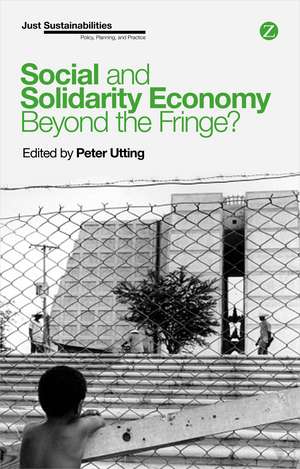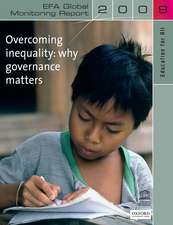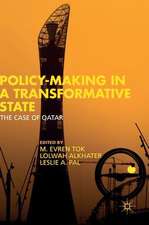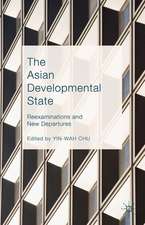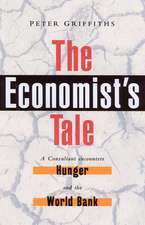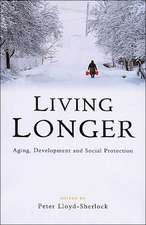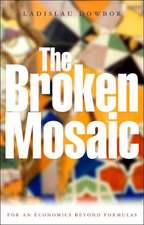Social and Solidarity Economy: Beyond the Fringe: Just Sustainabilities
Editat de Peter Utting Contribuţii de Suzanne Bergeron, Stephen Healy, Carina Millstone, Bénédicte Fonteneau, Georgina Gómez, Marguerite Mendell, Paul Nelson, John-Justin McMurtry, Cecilia Rossel, Abhijit Ghosh, Ananya Mukherjee Reed, Jean-Louis Laville, Justine Nannyonjo, Professor Bina Agarwal, Béatrice Alain, Prof Cristina Grasseni, Francesca Forno, Silvana Signori, Darryl Reed, Roldan Muradian, José Luis Coraggio, Milford Batemanen Limba Engleză Paperback – 8 apr 2015
Preț: 189.02 lei
Preț vechi: 217.51 lei
-13% Nou
Puncte Express: 284
Preț estimativ în valută:
36.17€ • 37.90$ • 29.90£
36.17€ • 37.90$ • 29.90£
Carte tipărită la comandă
Livrare economică 12-26 aprilie
Preluare comenzi: 021 569.72.76
Specificații
ISBN-13: 9781783603442
ISBN-10: 1783603445
Pagini: 402
Dimensiuni: 138 x 216 x 30 mm
Greutate: 0.54 kg
Editura: Bloomsbury Publishing
Colecția Zed Books
Seria Just Sustainabilities
Locul publicării:London, United Kingdom
ISBN-10: 1783603445
Pagini: 402
Dimensiuni: 138 x 216 x 30 mm
Greutate: 0.54 kg
Editura: Bloomsbury Publishing
Colecția Zed Books
Seria Just Sustainabilities
Locul publicării:London, United Kingdom
Notă biografică
Peter Utting is international coordinator of the Center for Social Economy (Centro para la Economía Social or CES), based in Nicaragua, and a senior research associate of the United Nations Research Institute for Social Development (UNRISD). Until August 2014 he was the deputy director of UNRISD, where he coordinated international research projects on social and solidarity economy and corporate social responsibility. He was instrumental in establishing the United Nations Inter-Agency Task Force on Social and Solidarity Economy in 2013. Recent publications include Business Regulation and Non-State Actors: Whose Standards? Whose Development? (co-edited with Darryl Reed and Ananya Mukherjee-Reed, 2012), The Global Crisis and Transformative Social Change (co-edited with Shahra Razavi and Rebecca Varghese Buchholz, 2012) and Corporate Social Responsibility and Regulatory Governance (co-edited with José Carlos Marques, 2010).
Cuprins
Introduction: The challenge of scaling up social and solidarity economy - Peter Utting Part I History, theory and strategy 1. Social and solidarity economy in historical perspective - Jean-Louis Laville 2. Prometheus, Trojan horse or Frankenstein? Appraising the social and solidarity economy - John-Justin McMurtry 3. Beyond the business case: a community economies approach to gender, development and social economy - Suzanne Bergeron and Stephen Healy 4. Can social and solidarity economy organisations complement or replace publicly traded companies? - Carina Millstone 5. Scaling the social and solidarity economy: opportunities and limitations of Fairtrade practice - Darryl Reed 6. The potential and limits of farmers' marketing groups as catalysts for rural development - Roldan Muradian 7. Institutionalising the social and solidarity economy in Latin America - José Luis Coraggio 8. Rebuilding solidarity-driven economies after neoliberalism: the role of cooperatives and local developmental states in Latin America - Milford Bateman 9. Enabling the social and solidarity economy through the co-construction of public policy - Marguerite Mendell and Béatrice Alain Part II Collective action and solidarity in practice 10. Beyond alternative food networks: Italy's solidarity purchase groups and the United States' community economies - Cristina Grasseni, Francesca Forno and Silvana Signori 11. Social and solidarity investment in microfinance - Paul Nelson 12. Balancing growth and solidarity in community currency systems: the case of the Trueque in Argentina - Georgina M. Gómez 13. State and SSE partnerships in social policy and welfare regimes: the case of Uruguay - Cecilia Rossel 14. Extending social protection in health through SSE: possibilities and challenges in West Africa - Bénédicte Fonteneau 15. Enabling agricultural cooperatives in Uganda: the role of public policy and the state - Justine Nannyonjo 16. Embeddedness and the dynamics of growth: the case of the AMUL cooperative, India - Abhijit Ghosh 17. Taking solidarity seriously: analysing Kerala's Kudumbashree as a women's SSE experiment - Ananya Mukherjee-Reed 18. Demonstrating the power of numbers: gender, solidarity and group dynamics in community forestry institutions - Bina Agarwal
Recenzii
By examining the conditions for scaling up social and solidarity economy, this book brings the politics of emancipation into the sustainable, inclusive and right-based development agenda. It does so in a reflexive and inspiring manner, pointing to spaces and strategies for capacity building, institutional innovation and social change, without neglecting either the internal constraints or the oppositional forces.
This book is a major pioneering work which critically documents the role and potential, as well as the challenges, of the social and solidarity economy in a worldwide perspective. It also reflects the leadership of UNRISD and the persistent efforts of Peter Utting to place SSE in the debates within and around the United Nations system.
Coming at a time when citizens around the world are searching for economic and organizational alternatives to the prevailing neoliberal economic model, and full of convincing examples and practical solutions, this book is a source of inspiration for everyone.
This book provides a progressive assessment of the history, theory, practice and potential of SSE over a wide geographical range. It is particularly good on scaling up to meet the challenges of competition and partnership with state, corporate and popular economies today.
Social and Solidarity Economy is essential reading for understanding this growing international citizen-based movement for a more inclusive and democratic economy. Each chapter illustrates how the social and solidarity economy can actively contribute to the emergence of a new, more sustainable and equitable development model for our planet.
The growing presence of the social and solidarity economy on all continents points to the real possibility of social, civic, ecological and technological changes that are conducive to more human-oriented growth models. This book demonstrates clearly how the social and solidarity economy can play its full role, without borders, as a friend of the Earth and of humankind.
This book is a major pioneering work which critically documents the role and potential, as well as the challenges, of the social and solidarity economy in a worldwide perspective. It also reflects the leadership of UNRISD and the persistent efforts of Peter Utting to place SSE in the debates within and around the United Nations system.
Coming at a time when citizens around the world are searching for economic and organizational alternatives to the prevailing neoliberal economic model, and full of convincing examples and practical solutions, this book is a source of inspiration for everyone.
This book provides a progressive assessment of the history, theory, practice and potential of SSE over a wide geographical range. It is particularly good on scaling up to meet the challenges of competition and partnership with state, corporate and popular economies today.
Social and Solidarity Economy is essential reading for understanding this growing international citizen-based movement for a more inclusive and democratic economy. Each chapter illustrates how the social and solidarity economy can actively contribute to the emergence of a new, more sustainable and equitable development model for our planet.
The growing presence of the social and solidarity economy on all continents points to the real possibility of social, civic, ecological and technological changes that are conducive to more human-oriented growth models. This book demonstrates clearly how the social and solidarity economy can play its full role, without borders, as a friend of the Earth and of humankind.
